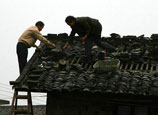
SHANGHAI is to encourage social investment in the local health market, especially in elderly care, rehabilitation, mental health, pediatrics, obstetrics and traditional Chinese medicine.
Private hospitals offering those services will have priority in being admitted to the medical insurance system.
Social investment includes enterprises, charity organizations, foundations and commercial insurance facilities.
Overseas investment is encouraged in the building of joint venture hospitals and clinics through cooperation with local hospitals, enterprises and other organizations while restrictions on foreign investment will be gradually eliminated, the Shanghai Health Bureau said yesterday.
Currently, the Chinese government only allows foreigners to set up joint venture hospitals and the domestic party must hold the majority share.
Mainland authorities have signed an agreement with Taiwan to allow investors from the island to set up wholly-owned hospitals in Shanghai and Jiangsu, Fujian, Guangdong and Hainan provinces, while similar agreements with Hong Kong and Macau allow the two cities to set up wholly-owned hospitals in Shanghai, Chongqing, Fujian, Guangdong and Hainan.
Currently, Shanghai is home to 1,379 private medical facilities - 169 hospitals, 1,201 clinics, and nine medical testing centers. Among them are eight joint venture hospitals and 12 joint venture clinics.
The health bureau said private medical facilities in Shanghai were still small - only five private hospitals had more than 200 beds and weren't capable of filling in the blanks in state-owned hospitals' services.
To meet the demand for medical services and to further health reform, the city government is adopting new policies to encourage private investment.
Under the new policies, private medical facilities will be included in the district's health framework. When there is demand for more beds and more hospitals, private facilities will have priority.
Social investment is also welcomed in the high-end market. Using the two major bases of Shanghai International Medical Zone in the Pudong New Area and the Shanghai New Hongqiao International Medical Center in Minhang District, private hospitals are encouraged to cater to high-end patients.
Social investors are also being encouraged to take part in the reform of state-owned hospitals to improve the quality of local services and improve hospital management, the bureau said.
The government is also promising favorable policies covering finance, tax and land and in attracting talented professionals with incentives including housing and children's schooling.
Dr Zhang Qiang, a vascular specialist who left a state-owned hospital for a joint venture earlier this year, said the policies would encourage foreign hospitals' engagement in the local health market by introducing international concepts and service.
"It will become a spur to local state-owned hospitals, which have poor management and unreasonable talent evaluation system," he said.
He added: "The introduction of international hospitals and private hospitals can attract good doctors and nurses to high-end facilities, while it will encourage state-owned hospitals to stop improper practices like prescribing unnecessary expensive medicines and tests for profit and poor services that are hardly in line with international standards."
















 1,000 dead ducks litter Sichuan river
1,000 dead ducks litter Sichuan river
No threat from Sichuan dead duck dumping: official


![]()
